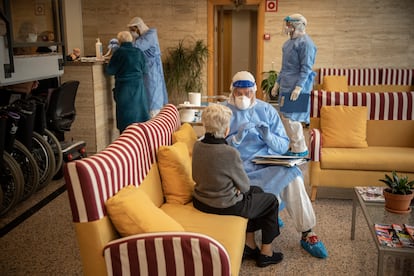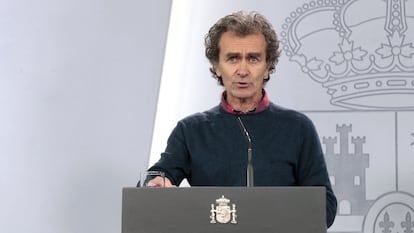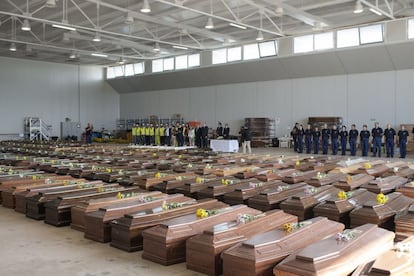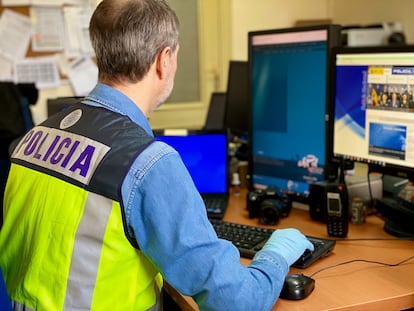Daily coronavirus deaths in Spain fall to 399, while confirmed cases now exceed 200,000
This number of victims is the lowest figure seen since March 22, and brings the total number of Covid-19-related fatalities to 20,852

The number of daily coronavirus deaths registered in Spain fell to 399 on Monday, according to the latest figures supplied by the Health Ministry. That is the lowest figure seen since March 22, when there were 394.
The latest data follows the significant fall in daily fatalities recorded on Sunday, when the number of deaths went from 565 to 410, the biggest drop in daily deaths since the crisis began.
However, the data should be viewed with some caution, given that there has been regular underreporting of coronavirus statistics from Spain’s 17 regions at weekends and on public holidays due to lower levels of personnel.
Health official Fernando Simón said today’s figures were “very promising”
There have been a total of 20,852 Covid-19-related fatalities since the pandemic hit Spain, with confirmed infections now reaching 200,210. More than 80,000 patients have recovered from the illness and have been discharged from hospital. There were 4,266 new cases on Monday, the lowest daily rise since March 17.
Speaking at the government’s daily press conference on Monday, Fernando Simón, the director of the Health Ministry’s Coordination Center for Health Alerts, said that the figures on the number of hospitalizations and intensive care admissions were “very promising.”
“Today is the first time we have fallen below 400 [daily fatalities], with a 2% increase compared to yesterday,” he added.
Simón also explained that Spain had significantly increased PCR testing, which is the most reliable detector of the coronavirus. “We have gone from 200,000 [tests] to 700,000 [in a week]. We are doing nearly four times as many PCR tests, but the infection rate is falling a lot, even more than what we thought.” In the first week of testing, 26.8% of those tested were found to be positive for Covid-19, compared to 3.1% last week, which indicates the outbreak is slowing, said Simón.

“I think the figures from the previous days should make us happy and content,” he said.
On the government‘s decision to allow children to leave the home under controlled circumstances from April 27, Simón said: “Children can be transmitters of the disease, but we have been under confinement orders for a month and a week. The chances that children are now infected is very low.”
After reaching a peak of 950 fatalities on April 2, the number of daily coronavirus-related deaths began a slow descent. The figures last week, however, plateaued, with 565 on Saturday, 585 on Friday, 551 on Thursday, 523 on Wednesday and 567 on Tuesday.
There are also variations in the data this week given that the Health Ministry is updating the historical series, after the government issued an order to the 17 regions in a bid to homogenize the different reporting of the data.
Civil Guard controversy

A political storm erupted on Sunday in response to statements made by José Manuel Santiago, the chief of staff of the Civil Guard. Speaking at the government’s daily press conference on the coronavirus crisis, Santiago said that the Civil Guard was working to stop disinformation “on the one hand, to avoid the social stress that these hoaxes cause, and on the other, to minimize the negative climate toward the government’s handling of the crisis.”
The comments sparked a wave of criticism from opposition parties, who accused the government of seeking to restrict freedom of speech. In a message on Twitter, Pablo Casado, the leader of the conservative Popular Party (PP), wrote: “The Civil Guard is not there to ‘minimize the negative climate toward the government’s handling of the crisis.’ [Prime Minister Pedro] Sánchez must explain if he has ordered the security forces to restrict citizens’ freedom of expression on social media to cover up their mistakes. It would be very serious.”
The PP and the center-right Ciudadanos (Citizens) have called on Interior Minister Fernando Grande-Marlaska to appear in Congress to explain the statements made by Santiago. When asked about the issue on Sunday afternoon, Grande-Marlaska said he hadn’t heard the general’s comments, and argued that they constituted a “slip of the tongue.”
Vox member accused of spreading disinformation

The political party Unidas Podemos, which is a junior partner in the Spanish coalition government, has filed two reports with the public prosecutor against the spread of misinformation regarding the coronavirus crisis on social media.
The first case involves a video filmed inside a warehouse, allegedly in Spain, that showed stacks of boxes of medical supplies. According to the person in the recording, these boxes were to be exported to France, despite the shortage of supplies in Spain. In actual fact, the warehouse was in Italy, and the boxes were filled with sheets of paper. The report accuses a National Police officer from a Madrid precinct, a worker from Palos city council in the southwestern province of Huelva, and Roberto Romero, a Vox coordinator in the Valencian city of Torrent, of spreading the misleading video, according to a document to which EL PAÍS has had access.
The second case involves the mass dissemination of fake and manipulated messages against the government. According to Unidas Podemos, an alleged “criminal organization” has been sharing a range of hoaxes on social media and instant messaging services. It cites two specific cases of messages that falsely claimed images of coffins and bodies in bags were taken in Spain, when they were in fact from Italy and Ecuador.
Government to set price of medical supplies
The Spanish government has issued a new ministerial order to combat the price gouging of medical supplies during the coronavirus crisis. The order, published on Sunday in the Official State Gazette (BOE), aims to ensure that all citizens can purchase supplies, such as face masks, gloves and hand-sanitizer gel, “in an informed way and under non abusive economic conditions.”
According to the BOE, “the objective of this order is to establish the process to fix the maximum public sale price of medical products, and those products that are needed to protect the health of the population against Covid-19.”
The exact details of the order will be finalized within two days, after Sánchez holds a video conference with the Interministerial Commission on Medicine Prices, which will be responsible for proposing what price should be set on health products.
Online scams jump 70% during quarantine

The number of criminal online scams has risen by at least 70% during Spain’s coronavirus lockdown, according to sources from the Civil Guard. These sources explain that fraudsters have been taking advantage of the coronavirus crisis to sell pirated health products. The National Police and Civil Guard warn that many of these product are “not certified” and have entered the European market via Romania and Bulgaria “where requirements are laxer.” In some cases, customers have made advance payments for products that have yet to arrive. According to Civil Guard sources, seniors have been targeted by the scams.
“The desperation to protect themselves, the shortage of the necessary elements to do so, and the lack of contact and experience dealing with providers, leads them to the fraudsters,” these sources explain.
Poll: 85% believe the government “could have acted earlier”
Some 84.7% of Spaniards believe that the government “could have acted earlier,” according to a new poll by research company 40 dB, commissioned by EL PAÍS. More than half (54%) of the respondents also said that the government had made more “more misses than hits” in its management of the crisis. However, 32% replied that the Popular Party would have handled the crisis the same way if it were in power, and 30% said the conservative group would have performed worse.
The poll also showed Spaniards have become increasingly concerned about the coronavirus crisis. The survey, taken between April 14 and 16, found that 96% of those surveyed were very (58.5%) or quite (38%) worried about the coronavirus crisis – compared to 92.3% in March.
With reporting by Patricia Ortega Dolz, Miguel Ángel Medina and Óscar López-Fonesca.
English version by Melissa Kitson.








































